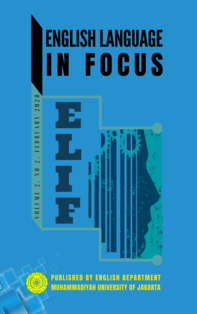Building FL-Vocabulary Transferability through Semantic Boggle
DOI:
https://doi.org/10.24853/elif.2.2.79-86Keywords:
Semantic Boggle Game, game-based learning, vocabulary transferability.Abstract
The purpose of this study was to investigate the effectiveness of the Semantic Boggle Game on building vocabulary transferability in foreign language students. The study was conducted in SMPN 177 Jakarta. The population in this study was all seventh-graders of which 7E of 35 students as the sample representative. The method used in this study was a quantitative method with a pre-experimental research design. In collecting the data, the writer used the students' pre-test and post-test. The data result indicates that the total students' pre-test scores are 2085 with an average score of 59,57. The total student's post-test score is 2745 with an average of 78,68. The results of the pre-test and post-test were calculated using a t-test. The calculation of the data result indicates that the t-count was 2,26 with t-table is 1,69 at the 0,05significance level. Therefore, this implies that the alternative hypothesis (H1) is accepted and the null hypothesis (H0) is rejected. The writers then concluded that using Semantic Boggle Game in teaching vocabulary is effective to build students’ vocabulary transferability.References
Al-Azawi, R., Al-Faliti, F., & Al-Blushi, M. (2016). Educational Gamification Vs. Game-Based Learning: Comparative Study. International Journal of Innovation, Management, and Technology, 7(4), 132–136. Retrieved from DOI: 10.18178/ijimt.2016.7.4.659
Al-Furqon, A. S. (2017). The Effect of Word Search Puzzle Game in Teaching Vocabulary to the First Grade students of SMPN 3 Proppo. Wacana Didaktika, 5(2), 101. Retrieved from https://doi.org/10.31102/wacanadidaktika.v5i02.25
Al-Sabbah, S. (2015). The Applications of Qualitative and Quantitative Research among Academic Staff in Psychology and Education: A Review of Practice. International Journal of Education and Research, 3(3), 715–726. Retrieved from www.ijern.com
Alqahtani, M. (2015). The Importance of Vocabulary in Language Learning and How to be Taught. International Journal of Teaching and Education, 3(3), 21–34.
Bakhsh, S. A. (2016). Using Games as a Tool in Teaching Vocabulary to Young Learners. English Language Teaching, 9(7), 120–128. Retrieved from https://eric.ed.gov/?id=EJ1101751
Carter, R., & Mccarthy, M. (2014). Vocabulary and Language Teaching. New York: Taylor and Francis.
Creswell, J. W. (2009). Research Design Qualitative, Quantitative, and Mixed Methods Approaches. London: SAGE Publications, Inc.
Ferčec, I., Liermann-Zeljak, Y., & Lenard, D. L. (2019). Games and Engaging Activities in the ESP/EAP Classroom. In K. Divini (Ed.), Options, Practices and Possibilities of EAP and ESP Practitioners. E-locus University of Crete Institutional Repository.
Ghorbani, M. R., & Rahmandoost, M. (2012). Higher Task-induced Involvement Load Enhances Students’ EFL Vocabulary Learning. Article in Journal of Language Teaching and Research, 3(6), 1202–1207. https://doi.org/10.4304/jltr.3.6.1202-1207
Loukas, M., & Ioannis, T. (2018). Game as a Learning Tool in Environmental Education. International Journal of Innovation and Research in Educational Sciences, 5(6), 2349–5219.
Sahrawi. (2016). The Effectiveness of Mind Mapping for Teaching Vocabulary to the Eighth Grade Students of SMP Negeri 3 Sungai Kakap in Academic Year 2012/2013. Jurnal Pendidikan Bahasa, 2(2), 236–247. https://doi.org/10.31571/BAHASA.V2I2.246
Saputra, H. N., & Hadi, M. S. (2019). Teaching Vocabulary through Fly Swatter Game. English Language in Focus (ELIF), 2(1), 17–24. Retrieved from https://jurnal.umj.ac.id/index.php/ELIF/article/view/4829/3356
Toma, I., Alexandru, C.-E., Dascalu, M., Dessus, P., & Trausan-Matu, S. (2017). Semantic Boggle: A Game for Vocabulary Acquisition. In 12th European Conference on Technology Enhanced Learning, EC-TEL 2017, Tallin, Estonia (pp. 606–609). Springer Verlag. https://doi.org/10.1007/978-3-319-66610-5_73
Wright, A., Betteridge, D., & Buckby, M. (2006). Games for Language Learning. Cambridge: Cambridge University Press.
Zhang, H., Song, W., & Burston, J. (2011). Reexamining the Effectiveness of Vocabulary Learning Via Mobile Phones. TOJET: The Turkish Online Journal of Educational Technology, 10(3), 203–214. Retrieved from https://eric.ed.gov/?id=EJ944968
Downloads
Published
Issue
Section
License
Authors who publish with this journal agree to the following terms:
- Authors retain copyright and grant the journal right of first publication with the work simultaneously licensed under a Creative Commons Attribution License that allows others to share the work with an acknowledgment of the work's authorship and initial publication in this journal.
- Authors can enter into separate, additional contractual arrangements for the non-exclusive distribution of the journal's published version of the work (e.g., post it to an institutional repository or publish it in a book), with an acknowledgment of its initial publication in this journal.
- Authors are permitted and encouraged to post their work online (e.g., in institutional repositories or on their website) before and during the submission process, as it can lead to productive exchanges, as well as earlier and greater citation of published work (See The Effect of Open Access).


